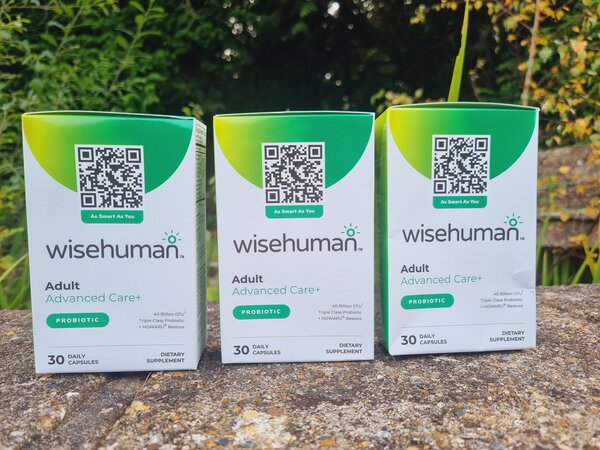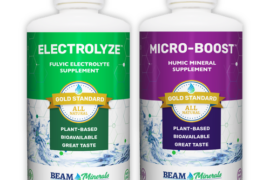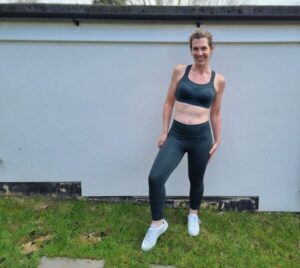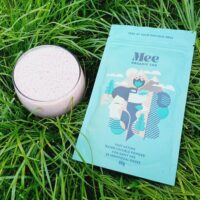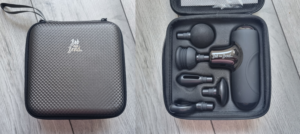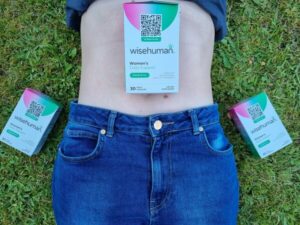Bloating is a common condition that affects most of us at some point in our lives. A sign that you’re bloated is when your stomach swells up and feels full and tight. Not only is it visibly noticeable, and so can make people feel self-conscious about their appearance, but it is also incredibly uncomfortable and often leads to other embarrassing issues such as gas and belching. In this article, I look at what causes bloating and the ways you can relieve it, as well as exploring the role probiotics can play in helping to prevent bloating. In addition to this, I review WiseHuman Advanced Care+ Probiotic and investigate whether this could be the answer to my husband’s ongoing battle with the bloat.
What Causes Bloating?
Bloating can be caused for a number of different reasons and can occur at various different times too. For example, women, who don’t usually suffer from bloating on a day to day basis, may find they experience bloating in the run up to their period. This is a common form of temporary bloating, which is caused by water retention, and can be easily treated by drinking extra fluids and exercising along with other things.
Other causes of bloating include:
- Overeating – Consuming excessive amounts of fried, salty, sugary, or processed foods feeds the bad bacteria in your gut.
- Food Intolerances – If you are intolerant to dairy or gluten this can lead to bloating as the body finds it more difficult to digest foods like this.
- Imbalanced Microbiota – We all have good and bad bacteria in our gut, but when this balance sways too much to the bad side it can cause bloating.
- IBS – Bloating occurs because of increased gas production and too much of the wrong kind of bacteria in the intestines.
- Infection – If there doesn’t seem to be any reason as to why you’re bloated, it’s possible you may have an infection or some other medical problem going on. If you have any concerns, always speak to your GP.
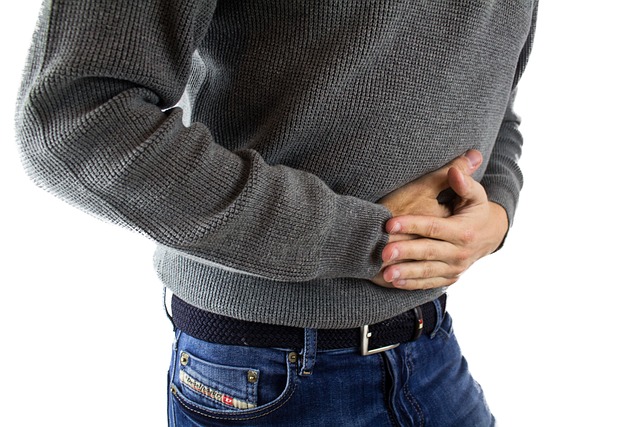
Ways To Relieve Bloating
Aside from the fact you probably don’t like the look of your stomach when it bloats, there are some other unwanted side effects that come with it too. Common symptoms include stomach pain, discomfort, gas, belching, and abdominal gurgling. You may also notice a difference in your bowel habits, either that you’re constipated or suffering from diarrhea. None of these are things you should have to put up with or live with. They can actually be incredibly debilitating and cause mental stress too. Thankfully there are ways to alleviate bloating, either through lifestyle changes or by introducing supplements to your diet.
Here are some things you should be thinking about if you want to beat the bloat:
What You Eat
Steer clear of processed foods, dairy, cruciferous vegetables like cauliflower and cabbage, fruit like peaches and plums, beans, and lentils as they can all cause bloating. Instead, introduce anti-inflammatory herbs into your food such as ginger, fennel, peppermint, and cumin that will help to stimulate digestion and reduce the build up of gas in your gut.
How You Eat
It’s not just what you eat that can affect bloating, but also how you eat. Chew your food slowly, it’s not a race. When you eat too fast you also ingest extra air and this causes gut problems. Likewise, drinking too much water when you eat, drinking through a straw, or talking whilst eating all increase the bloating risk. Space meals out throughout the day, so that the body has time to digest the previous meal. And take your time!
Lifestyle Choices
Things like smoking and drinking too much alcohol can contribute towards inflammation in the body and gut dysbiosis; a disruption to the microbiome.
Supplements
You could do all of these things, but sometimes your body needs a bit more help, and this is where probiotic supplements come in. Supplementing your body with a probiotic can help to restore balance in the gut and therefore reduce bloating. You can also aid this process by taking a prebiotic supplement like WiseHuman Prebiotic Fiber Boost to help feed the probiotics that you have introduced to your gut, which allows them to do their job even better.
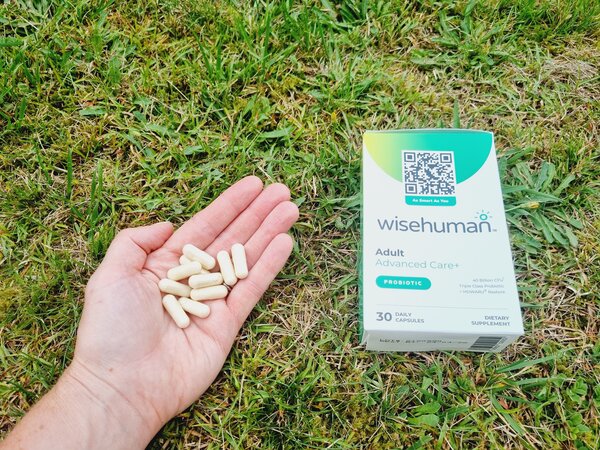
Exercise
Exercise can help to improve circulation and digestive movement, which lowers the risk of bloating. Aim to move for 30 minutes a day to help your body function at its best.
Sleep
Lack of sleep or disrupted sleep can lead to us craving sugary, fatty, processed foods, which as we’ve learnt is a recipe for bloating. Try to sleep on your left side as this helps digestion. If you struggle with sleep, implement some good sleep hygiene practices like going to bed at regular times, making sure your bedding is changed regularly, not eating or drinking past a certain time, avoiding caffeine, and keeping blue light from devices out of the bedroom.
Address Your Stress Levels
It’s not just our mental health that is affected by stress, our bodies feel the effects too and there is a proven link between stress and the health of your gut microbiome. Stress can cause digestion to slow down, creating problems such as constipation, and it can also cause it to speed up, resulting in diarrhea, both of which are accompanied by bloating. Deep breathing exercises and meditation are great ways to destress, which not only makes you feel better mentally but also allows your digestive system to reset and then concentrate on doing its job properly.
For now I want to focus on probiotics and the role they play in the health of our gut, so let’s take a look:
How Can Probiotics Help With Bloating?
Humans have over 100 trillion microbial cells in their guts which all work together to aid digestion, immunity, metabolism, and nutrition among other things. Of these cells, some are made up of good bacteria and some are bad. We need both types for optimal function, but most importantly we need them to be balanced. Too much bad bacteria, and that’s when we experience problems, such as bloating.
Probiotics are live microorganisms (bacteria and yeasts) that help to support, regulate, and rebalance the bacteria that lives in our guts. By introducing a good quality probiotic supplement the aim is that this will aid digestion, absorb excess gas, ease bloating, and help decrease the chances of you experiencing digestive issues like constipation, IBS, diarrhea, etc. And they do this by increasing the levels of good bacteria, decreasing the levels of bad bacteria, and reducing inflammation in the gut and intestines.
When people have had an infection or illness for which they are prescribed antibiotics, this can have a very unsettling effect on their microbiome. Taking probiotics, especially a stronger potency one like Wisehuman’s Advanced Care+ Probiotic, can really help to resettle the balance and get things working optimally again.
Or as you noted, a stronger probiotic to help bigger impact if someone DID choose to do a 30-60 cleanse (e.g., one could take this probiotic and then transition to Daily Support for maintenance thereafter).
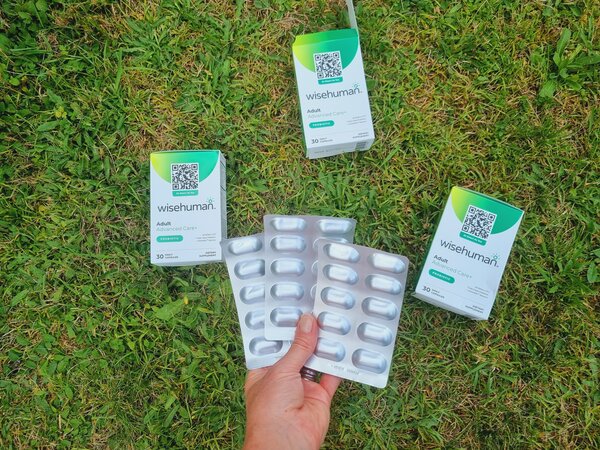
WiseHuman Advanced Care+ Probiotic
The strains of probiotics that help with bloating the most are Bifidobacterium and Lactobacillus, and WiseHuman Advanced Care+ Probiotic contains both of these, as well as Saccharomyces boulardii.
So, let’s take a look at what these different strains of probiotics can bring to the party:
- Bifidobacterium – This bacteria helps keep you regular, so it’s great if you suffer from constipation.
- Lactobacillus – This good bacteria can reduce gas and in turn alleviate bloating. It is particularly good at relieving the pain and discomfort of IBS (Irritable Bowel Syndrome).
- Saccharomyces boulardii – This yeast can help with flatulence, diarrhea, gurgling, and belching. It produces antimicrobial peptides, stimulates the immune system, improves gut barrier function and inhibits inflammation. It can be taken to alleviate IBS, antibiotic associated diarrhea, Crohn’s disease, and Ulcerative colitis.
What makes WiseHuman Advanced Care+ Probiotic stand out is that it whilst it has comparable levels of Saccharomyces boulardii to other probiotic brands, it also contains the two other strains (Bifidobacterium and Lactobacillus) for pretty much the same price as those just containing Saccharomyces boulardii.
This triple class probiotic contains 40 billion CFU (Colony Forming Units) and comes in delayed release capsule form, which basically means all that healthy good stuff doesn’t get released until it reaches where it needs to without being damaged by digestive acids and bile. Each pack contains 30 of these capsules, contained in 3 individually packed blister packs, which allows them to be stored without the need for refrigeration. It is important to let you know that this is a stronger potency probiotic, and like all probiotics there is an adjustment period where your body takes a while to get used to it. Side effects should only last for a maximum of 2 weeks and may include things like bloating, intestinal pains, and skin rashes. Which I get are exactly the symptoms you’re trying to get rid of, but you need to trust the process. This is your gut rebalancing itself. None of this is going to be a magical overnight fix, so allow the probiotic time to do its thing and let your body process this new bacteria that you’ve introduced.
Now, I would have carried out this probiotic review myself, however I have been busy taking WiseHuman’s other probiotic supplement, Women’s Daily Support, so I needed another tester who was willing to try this one out for me, and that’s where my husband comes in. You see, he has had problems with bloating since his early 30s (he’s now in his late 40s) and was keen to see if this could alleviate some of the discomfort he experiences. To give you a bit of background, he started getting mild stomach pains and bloating and so went to the doctors for help. He was diagnosed with probable IBS and was advised to cut out certain foods, like caffeine, alcohol, dairy, bread etc., and to keep a food diary, but none of it seemed to make much of a difference. Over time it has eased, with the occasional flare up, but mostly he has learnt to live with it. Whilst the discomfort that comes with a flare up is annoying to him, what bothers him the most is his permanently bloated belly. Something he partly puts down to middle age spread and lack of exercise, but also which he knows is related to his gut problems and so he is keen to try something natural that may be able to help.
He has now been taking WiseHuman Advanced Care+ Probiotic for a couple of months and he has noticed that he feels more comfortable nowadays. His bloating, whilst not gone entirely, does feel less of a problem and he doesn’t mention it as much as he used to, which speaks volumes. I think it’s important we understand that a probiotic is a supplement, as in it supplements our diet as well as our other lifestyle choices. And so in order for it to work at its best we need to address the other areas in our life that could be affecting our gut issues. In my husband’s instance, he is currently suffering from an ongoing back problem which means he can’t exercise anywhere near as much as he would like to, so of course this is going to have an impact. In an ideal world, if he were to take this 100% seriously he should have eliminated all sugar and carbs for 30-60 days, avoided alcohol, and not eaten bananas or fruit. The reason for this is that it starves the bad bacteria and yeast which allows for the growth of good bacteria, thus resetting the balance. He wasn’t able to do this entirely, although he did cut down on all things, which would have helped a little, but likely the rebalancing process will take longer. In terms of side effects he actually wasn’t too bad. He had a few intestinal cramps and stomach discomfort for the first week, but his bloating was neither better or worse during this adjustment period and there were no skin rashes or other disturbances. Two months on and how is he feeling? Well, he’s still bloated, but he says that it doesn’t feel as uncomfortable as it used to, as though there’s an easing of pressure, and he’s really pleased with that. He’s definitely going to continue with both the probiotic and prebiotic, as they have become part of his morning routine and he can see that this is about playing the long game.
It is recommended that when starting your probiotic journey you go on a 30-60 day cleanse. This involves giving up ALL carbs for 30 days and instead eating vegetables, protein, and flavourings like salt, pepper, lemon, oil etc. to keep it interesting. It will be tough, let’s not beat around the bush, after all many of us have developed bad habits when it comes to the food we eat. And the first 2 weeks are by far the hardest part of the process. But in the grand scheme of things, 2 weeks is nothing, right? Because once you get past that point (and for some people it can be just a matter of days) you are well on your way to feeling less bloated, more energetic, and far more gut happy.

Final Thoughts
Probiotics are a great way to support your gut microbiome and in the process look after your overall health and wellbeing. Whilst it can be difficult making the relevant lifestyle changes, after all many of us find it difficult breaking habits and changing our routines, if your gut health is impacting your quality of life it is definitely worth considering. To find out more about WiseHuman’s range of probiotics visit their website here.
*WiseHuman Advanced Care+ Probiotic and WiseHuman Adult Daily Boost gifted for review.

